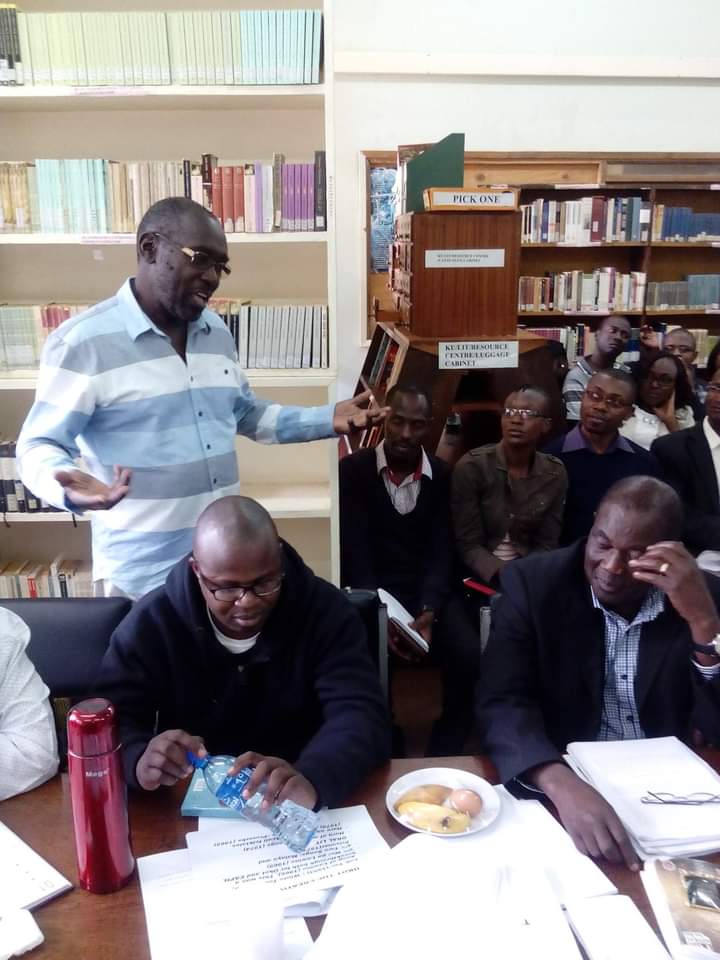

Ten days later, at a National Drama and Theatre Workshop held on November 23, a minute of silence was observed in his honour. Hundreds of participants stood solemnly at Afraha High School in Nakuru county, marking the void left by this legendary thespian, theatre critic, theatre/literature professor and mentor.
The story of Prof Obura’s illustrious career in theatre began long before his days as a professor. Born in 1953, his journey into the limelight commenced in the 1970s, when he, aged 23, joined the Nairobi University Players, a troupe founded by the Ugandan theatre luminary John Ruganda. It was during this era that Obura gained his first significant role in Muntu, an epic play penned by Ghanaian expatriate Joe de Graft, who was then teaching at the University of Nairobi.
Muntu premiered at the Kenya International Conference Centre during the Fifth Assembly of the World Council of Churches on November 24, 1975, captivating audiences with its profound exploration of our African identity. Subsequent performances were held at the University of Nairobi’s Education Theatre II, where Obura played the role of Second Neighbour. Sharing the stage with theatre icons such as John Sibi-Okumu, David Mulwa and Francis Imbuga, Obura quickly distinguished himself as a rising star.
One of the highlights of his acting career came with his portrayal of Bwogo in The Floods, a satirical drama critiquing the brutal dictatorship of Idi Amin. Directed by the exiled Ugandan theatre guru John Ruganda, a mentor of Obura, the play debuted at the French Cultural Centre in Nairobi on 1 March 1979 before moving to Education Theatre II. Obura’s powerful performance earned him acclaim, and the production went on to represent Kenya at the Festival of Small and Experimental Scenes in the former Yugoslavia. The troupe performed in cities like Banja Luka, Zenica, Mostar, and Sarajevo, showcasing Kenyan theatre on a global stage.
Tragedy struck, however, during this period. Stella Awinja, a promising engineering student at the University of Nairobi with natural talent for the stage, and Obura’s co-star who acted as Nankya, died in 1982 when a falling rock hit her during the construction of Lilian Towers in Nairobi. Stella’s untimely demise deeply affected Obura and the theatre community. He told us this in one of his lectures, his back towards us, his changed voice lower than his normal baritone, his eyes facing the horizon outside the lecture hall window. In her honour, the University of Nairobi renamed Mary Hall to Stella Awinja Hall in 1990 and established an award in her memory at the National Drama Festival.
***
Throughout the 1980s and 1990s, Prof Obura transitioned from acting to academia, serving in various high-level administrative roles at Moi and Maseno universities before returning to his first love, theatre. From 2002 at Kenyatta University, he became a visible cornerstone of the postgraduate theatre courses of the Literature Department and its sister Department of Communication, Media, Film and Theatre Studies, mentoring students in both theatre arts and drama across levels of learning. His lectures were renowned for their depth and eloquence, covering everything from stagecraft to the analysis of intertextuality between literary texts and their film adaptations.
His influence extended beyond Kenya’s borders. Obura supervised numerous research projects, particularly those exploring ritual theatre and indigenous aesthetics in Ghana and Nigeria, fields that aligned with his Decolonial school of thought led by his former teacher Ngugi and Walter Mignolo, among others. He collaborated with other dons, such as WH Olembo and the late Wasambo Were, to run the Kenyatta University Culture Week and nurture new talents in the theatre arts. As an external examiner, he served many universities locally and across the region in assessment of research in theatre arts at masters and doctorate levels, tours of duty that cemented his international theatre recognition.
For Obura, the philosopher, theatre was not merely an art form; it was a powerful tool for addressing societal challenges. He often spoke about the role of drama in combating issues such as drug and substance abuse in schools, a concern he shared with his mentee, Oliver Minishi, a celebrated figure in Kenyan theatre.
In one memorable conversation at the Blue Post Hotel, overlooking the Chania Falls, my departed master explained how theatre could serve as a medium for social transformation. He believed that by engaging students in performance art, educators could instil values and foster critical thinking. His vision was aligned with that of renowned theatre critics like the recent late Margaretta wa Gacheru, who emphasised the need for constructive criticism to nurture the performing arts. Both arose out of the fecund Kenyan theatre scene of the 1970s.
In recognition of Prof Obura’s contributions, Kenyatta University is planning an International Memorial Lecture in late 2025 to honour him alongside his contemporary, the late Prof Francis Imbuga. This event will celebrate their immense contributions to Kenyan theatre and their impact on the global stage.
Sadly, the demise of Prof Oluoch Obura leaves a significant void in Kenyan theatre. Yet his legacy endures through the countless lives he touched as a teacher, mentor and performer. His work embodies the essence of Pablo Picasso’s words:
I regard the theatre as the greatest of all art forms, the most immediate way in which a human being can share with another the sense of what it is to be a human being.
Through his acts, Prof Joseph Andrew Oluoch Obura (1953-24) shared his humanity, leaving behind footprints of knowledge and inspiration among us. His journey may have ended, but his story will continue to resonate in the hearts of those who knew him and the many more who will discover his legacy through the generations.
A luta continua.
















